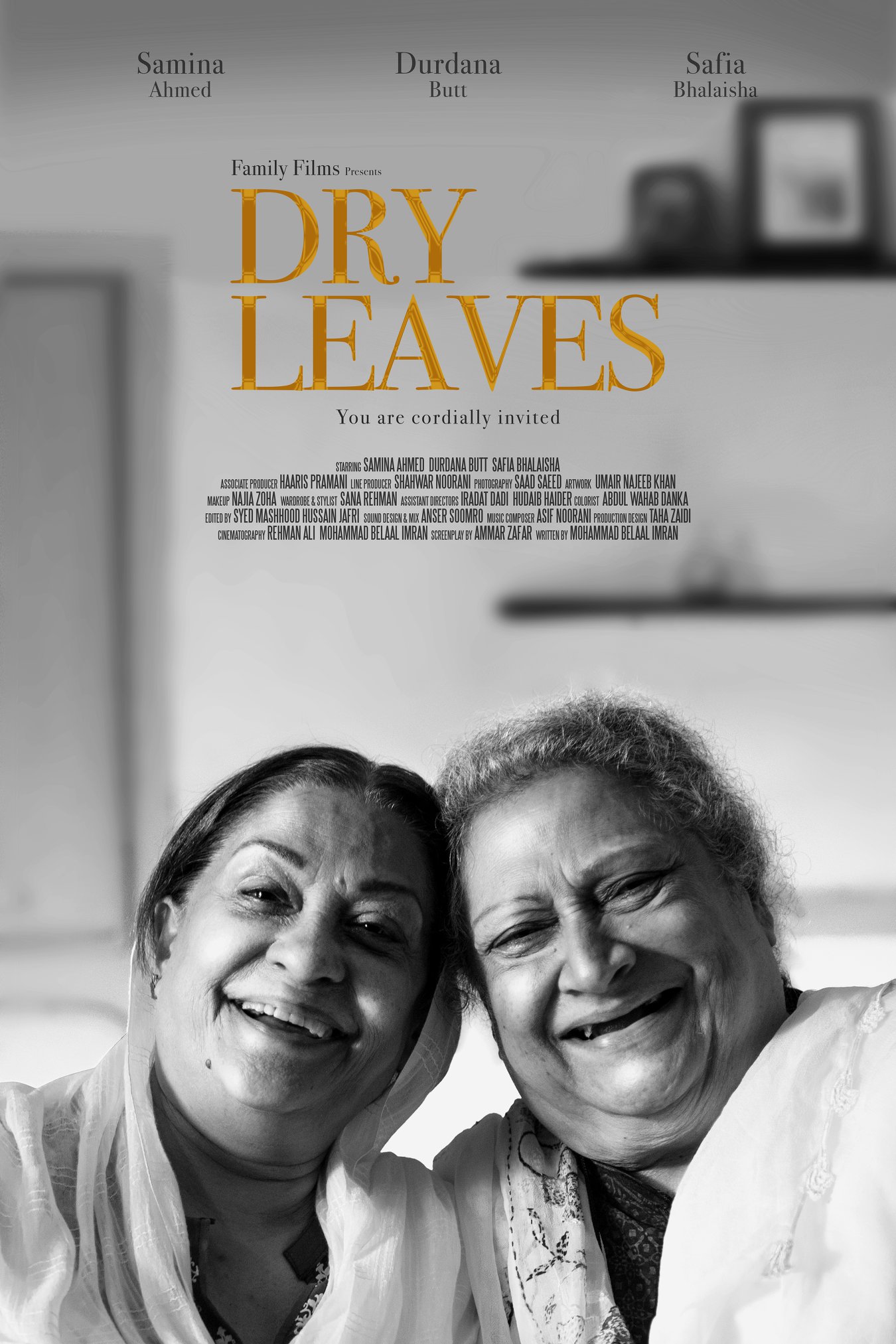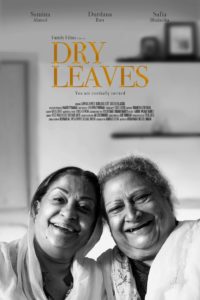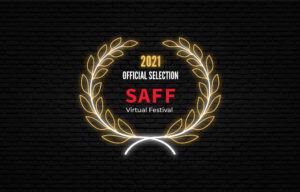
VSAFF 2021 Short Film Review “Dry Leaves”
NO TRAILER CURRENTLY AVAILABLE
First, the Recap:
A deliberation of the future. What does it hold? What fate awaits? How is a life reflected upon, it’s meaning, and the value of those who were so deeply a part of it? These questions can often manifest as the ever-present and always relentless taskmaster that is time marches on, towing us along in its inexorable grasp towards the inevitability of old age. As much as we might try to deny or even avoid it, realities associated with growing old can actually be a joy–or a burden when uncertainty and anxiety is constant. As she watches her son drive away, Zahida (Samina Ahmed) is slow to accept the new actuality she faces upon entering her new, supposedly temporary, place of residence–a group home for the aged. Upon meeting veteran resident Farhat Ul Ain (Durdana Butt), she sees potential for happiness–or the possible specters of what might lie ahead.
Next, my Mind:
There’s a staunch assuredness in thematic weight and relevancy paired with an overall, definitively impactful intent that is revealed within the confines of this nine-plus minute independent short film effort from director/executive producer Ali Sohail Jaura, writers Muhammad Belaal Imran and Ammaz Zafar, and producer Dheeraj Jindal which lays such a potent groundwork for a quietly volatile study in the realities of growing old and the accompanying unease that pours down upon us when we really take stock of what it means to see the latter years of what suddenly seems like an all-too-brief life coming into its twilight stage. It’s something none of us truly WISH to explore or ponder, but this film takes the concept and makes it one to both challenge and encourage, speak joy and heartache, and bring about an awareness that this critic feels should rightly jolt us yet also remind us of how important it is that we respect and wholly recognize the wisdom and love of, in this case, our parents (or a parent) as they enter this time. This is actually my second time screening the film, this opportunity arriving thanks to the 2021 Virtual South Asian Film Festival presented by Toyota USA, supported by AARP, produced by Jingo Ventures, and in association with DFW SAFF & NYC SAFF.
Seen through the eyes of a mother whose son has just dropped her off at a home for the elderly, under the impression it is only a temporary circumstance, she quickly showcases all her insecurities and inner fears about accepting this as a fact, even when we get the impression that her stay might actually be longer than she anticipates. Seeing her resistance to become even partially acclimated to her fresh residence, the connection she unexpectedly makes with a veteran resident seems to be a harbinger for at least some sense of peace about it all. Yet, as the film initially presents this sentiment and notion of hope, the finale ushers in a whole different perspective that shakes the foundations of everything she was just beginning to grasp as positive and makes her go back into a state of questioning, which is further emphasized via beautifully executed metaphorical means through the imagery and/or even sounds associated with dry leaves blowing in the breeze. Amidst all the heavier drama, there are still wonderfully affecting moments of happiness to be had as well, and it does at least bring that touch of levity that evens out the grander, weightier thematic explorations.
With that in mind, this narrative could certainly be construed as a portrait of abandonment, perhaps even experiencing being unwanted, and having to then further confront an aspect of older age that consequently causes further introspection, wondering whether this could also be coming down the road for the lead character as well. But, I also feel that within this there is such a worthwhile attempt to allow the viewer to still find a level of joy and engagement in these themes and how they are portrayed so as to realize that as hard as specific facets of seeing someone, especially a loved one, being at the starting point of “fading” away can be to tolerate or handle, there desperately needs to be a deeper commitment and fortitude to BE THERE for them, rather than so callously forcing them to address their aging alone. It’s sad that this actually DOES occur when families do legitimately “dump” their elderly parents in a home so as to no longer have to be “inconvenienced” by them. I honestly hope this film speaks volumes AGAINST those actions and promotes better acknowledgement of those who raised, provided for, and loved us.
Ahmed is a picture of poise, grace, and highly experienced acting prowess in her role here as Zahida, an older woman on the cusp of having to tackle what could become the most formidable period of her life as she finds herself being left off, again supposedly on an impermanent basis, at a group home by her son. Immediately acting like she doesn’t at all wish to be there (which is most likely completely true), “settling” in is a burden she clearly tries to avoid. But, upon meeting long-standing resident Farhat who initiates a more relaxed, matter-of-fact, jovial atmosphere for Zahida, things seem to be on the up and up. But, when the events take an unanticipated turn, it once again allows Zahida’s concerns and internal questioning to arise stronger than ever. It is all played with a magnificently understated strength and intensity by Ahmad and most definitely endears you to the character and her plight with total resolve and resonance.
Likewise, Butt brings an equal level of controlled, muted, but no less poignant performance through her role as Farhat, a long time denizen of the group home Zahida now must call HER home as well, who tried from the very start to just be a happy-go-lucky spark of hope for the new arrival, trying to make her feel welcome and even wanted. Farhat does almost anything, the most simplest of things, to open Zahida up a bit and allow her to feel that sense of being noticed, even as Farhat also excels in challenging Zahida TO “loosen up” while sharing a tale of her own life and a particular event she’s looking forward to that’s soon to happen–until it’s revealed otherwise and provides the film’s more stirring and heart-wrenching reality that then manifests into moments of Zahida’s dwelling upon what her own future might manifest. It’s a subtle yet powerful character-driven performance that Butt delivers and is so integral to the film’s ultimate objectives and message.
The primary supporting, but still key, role arrives from Safia Bhalaisha as the head nurse at the home Zahida and Farhat among others inhabit and is the one who ends up disclosing a mindset-altering fact that shakes Zahida’s world and thoughts about being in the home. So, in total, with it’s smoothly shot, purposeful imagery and uncomplicated yet atmospheric music score aiding in bringing the story to vibrant, affecting life, “Dry Leaves” is a steadfast illustration of the means by which independent cinema so deftly manages to maintain a consistent and noteworthy influence–it’s ability to reflect our humanity and the myriad of elements that make up the journey we’re on by having the willingness to tackle subject matter which makes us think, reflect, consider, and ideally put into action what is being shown in a manner that could honestly bring about a better world for us all, even when the truths brought forth are hard to concede.
As always, this is all for your consideration and comment. Until next time, thank you for reading!



